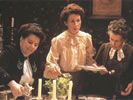Eye For Film >> Movies >> The Dead (1987) Film Review
Many consider The Dead to be the finest short story in the English language; so bringing it to the screen was an almost impossible task, not least because it is such an internal piece of fiction.
John Huston and his son, Tony, who wrote an elegant and subtle screenplay, which was Oscar nominated, rise to the occasion with consummate ease. Everything about this film, from the music to the script to the cinematography, oozes the period. It is delicate and unhurried, warm and welcoming, like the family Christmas get-together, with music and dancing, in turn-of-the-century Ireland that it chronicles.

The atmosphere Huston engenders is one of connectedness of community, of a gregarious family that takes turns enchanting us with music, with humour, with stories. And yet the screenwriter, director and cast, whilst conveying a delight in the superficial notion of social company, gossip, musicality and conviviality, also reveal a sense of suppression and repression.
The cast is astonishing. Anjelica Huston, as Gretta Conroy, gives one of her finest performances as the woman who has kept hidden from her husband her love for Michael Fury, a man who died because she couldn't be his. Her walk down the stairs, as she listens to a song that reminds her of him, is one of the most simple and yet most poignant imaginable. I freely admit that movies often reduce me to tears but I defy anyone not to be moved by this performance.
Likewise Donal McCann, as the disdainful Gabriel Conroy, who considers himself superior to the other guests, gives a performance of great finesse. We see the events of the night through his eyes and he conveys an extraordinary weight of inner sadness when he learns in the course of it that his love for his wife has never been, nor will be, reciprocated. But it is not just the principles who contribute to the power of this film, the whole cast contributes to a seamless ensemble production which has the immediacy and intimacy of the stage.
Ostensibly the film is about a party and the protagonists who people it, who all know each other very well, and yet ultimately it is about love, that is lost, or never found. In the end, Gabriel realises that he has never shared even the smallest glimpse of true love with his wife. The key moment in the film is indeed Gabriel's, as he weeps for the man whom his wife once loved, a man he never met. In weeping for him, he weeps for man's predicament. With knowledge, choice and consciousness comes the ability to know loss and grieve for it.
John Huston is reported as saying that "all I know about filmmaking is in this film." And it shows. It is graceful, visually and verbally. It is stately and serene and yet humorous, allowing the story to unfold through the characters, who bring meaning and insight with exquisite dialogue and the subtlest of acting.
Watching the film is like being invited into the room with them to share the music, the dancing, the food. There is a much-quoted line that bears repetition here: "Better pass boldly into that other world, in the full glory of some passion, than fade and wither dismally with age." The Dead is alive with such emotion and wisdom.
Huston suffered chronic emphysema during its making and died shortly after its release, but he had the courage and imagination to transform one of the greatest stories ever told onto celluloid and so it remains the finest testament to his skills as a director - his requiem, if you like.
This is a film that should be in every home.
Reviewed on: 09 May 2006

















